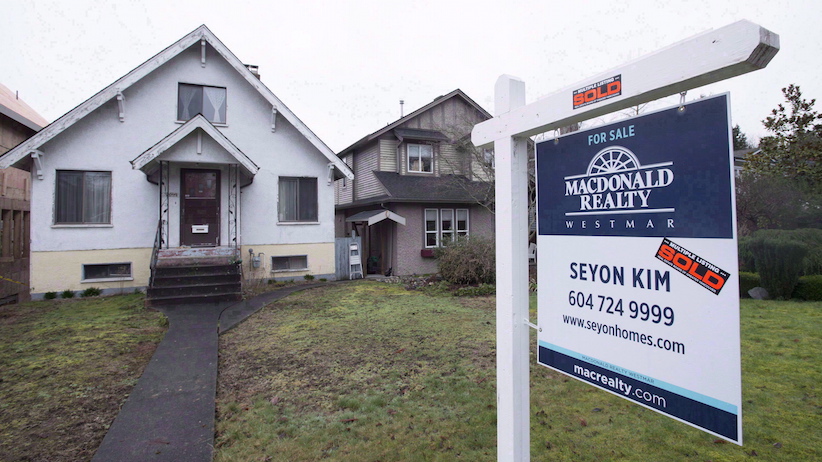CIBC: It’s time for a ‘flipping tax’ on foreign investors
An economist says a flipping tax would help tackle speculative foreign investment—but do little to slow soaring house prices
Realtors’ signs are hung outside a newly sold property in a Vancouver neighbourhood where houses regularly sell for C$3-C$4 million ($2.7-3.6 million) September 9, 2014. Chinese investors’ global hunt for prime real estate is helping drive Vancouver home prices to record highs and the city, long among top destinations for wealthy mainland buyers, is feeling the bonanza’s unwelcome side-effects. The latest wave of Chinese money is flowing into luxury hot spots. But it has also started driving up housing costs elsewhere in a city which already ranks as North America’s least affordable urban market. Julie Gordon/Reuters
Share

In the bubbly world of Canadian real estate, the house “flip” has gone from revered to feared—depending largely, it seems, on who is doing the flipping.
The idea of buying a home, sprucing it up and selling at a profit a few months later is celebrated by at least a half-dozen popular reality TV shows, several of which are either made in Canada or involve Canadians: Love it or List it, Flip this House, Home to Flip, Flip or Flop and the strangely named Masters of Flip. At the same time, however, there’s growing angst that foreign buyers—namely from mainland China—may be getting into the game, leading to calls for some sort of speculation tax in provinces like B.C.
Benjamin Tal, the deputy chief economist, at CIBC World Markets, weighed into the debate with a research note that, effectively, concluded a “flipping tax” on foreign investors isn’t the worst idea in the world since it could help curb a potentially problematic element of foreign investment. However, Tal also acknowledged that such a tax is unlikely to have much impact on soaring house prices in Vancouver and Toronto since there’s little evidence foreign buyers are more likely to flip a property than Canadian ones.
Tal says his unscientific research into the subject—consisting mainly of a recent dinner with over 20 real estate brokers and agents who deal exclusively with foreign buyers—led him to believe the number of “pure” foreign purchasers in the Canadian real estate market is “probably much smaller than perceived by many.” A more likely scenario, he says, is a “satellite family situation” in which foreign money is used to purchase homes for family members to live in—mostly wives, children and students.
That said, Tal goes on to write that there’s a “clear sense of urgency” among many Chinese citizens to send their money out of the country because of a risk of a devaluation of the yuan. He adds that many real estate agents are also focused on a Chinese pilot program that’s being tested in five cities, including Shanghai, that allows wealthy individuals to invest at least 50 per cent of their assets in foreign markets. “That can potentially give a significant boost to what’s allocated to international property markets,” Tal writes. “And with the 20 per cent depreciation of the loonie relative to the yuan, Toronto and Vancouver look very attractive.”
The problem, of course, is that Canada currently has no idea how much foreign money is washing up on its shores, let alone how much more could be yet to come. The Canada Mortgage and Housing Corp. is currently studying the issue, as is the province of B.C. But so far there’s relatively little data to go on.
Other countries are slightly further ahead. Tal notes that Australia limits foreign purchases of homes to new housing stock while New Zealand has introduced a capital gains tax on properties sold within two years of purchase. The U.K. introduced a capital gains tax of up to 28 per cent on foreigners selling property. “It’s way too early to assess the impact of those changes,” says Tal. “But there are some early signs from Australia showing that it’s working; the share of foreign buyers in new housing demand fell from 16 per cent in Q3 2015 to the current 12 per cent.” On the other hand, critics have blamed the Aussie rules for contributing to a boom in unsightly condo towers aimed at foreign investors while doing little to bring sky-high house prices in cities like Sydney and Melbourne back down to Earth.
Yet, even armed with better data, the choice before Canadian policy-makers will be far from straightforward. In a country where nearly three of every four Canadian households own their own home, any policy designed to limit the pool of potential buyers could negatively impact a lot of families (and could therefore make the politicians who introduce it very unpopular). Indeed, the B.C. government has so far balked at calls for a speculation tax by Vancouver Mayor Gregor Robertson and others, claiming it could suck as much as $1 billion out of the local real estate sector without having a meaningful impact on house prices. On the other hand, rapidly escalating prices in cities like Vancouver are causing young families to flee for cheaper locales and creating employment headaches for local businesses—a situation likely to get worse before it gets better.
Tal says a flipping tax on foreign investors could be a “step in the right direction” while Canadians wait for more data about the scope of the problem. “We don’t know how big it is, but we know it’s not constructive,” Tal says of purely speculative foreign investment. In other words, it’s the perfect political solution—one that promises much, accomplishes little and angers almost no one.